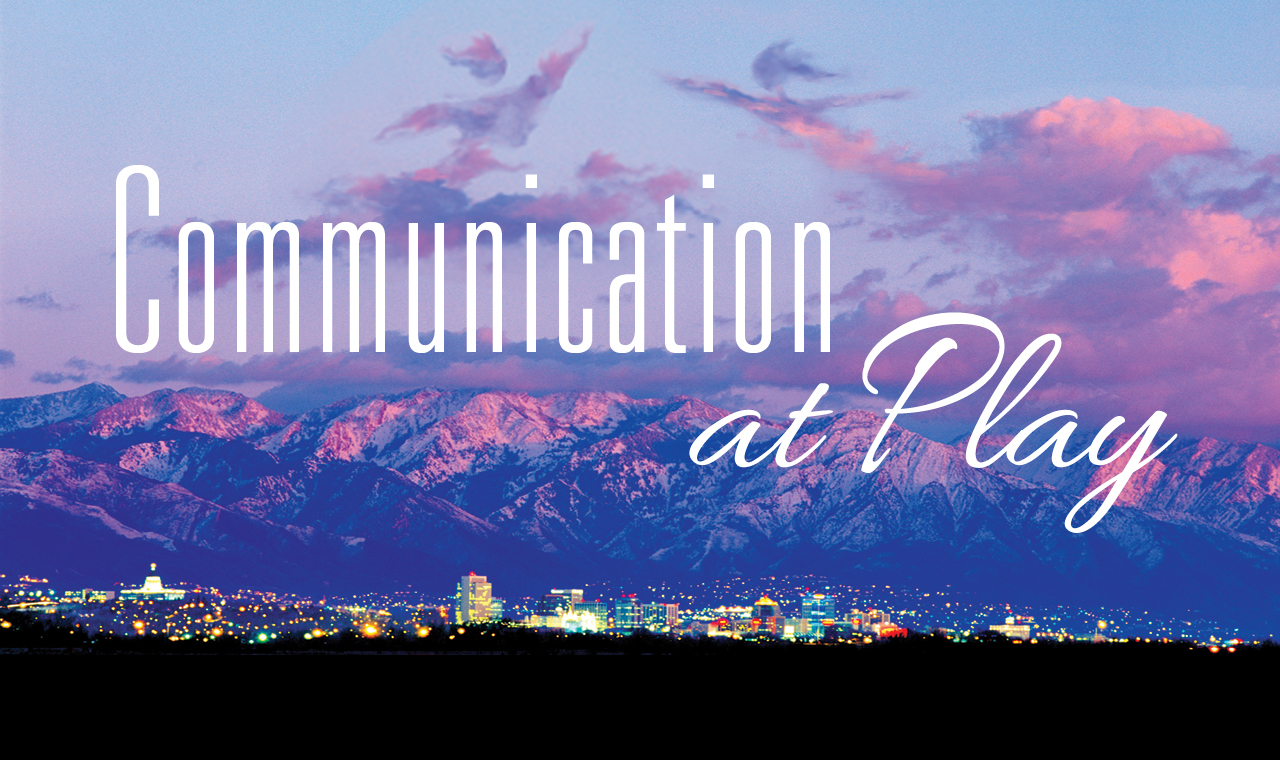Comm@Nca, 2018
October 19, 2018

Terps participate in 104th Annual Convention in Salt Lake City.
UPDATE: More Terps receive awards in Salt Lake City! Assistant Professor Carly Woods and Ph.D. student Darrian Carroll receive accolades at NCA.
Dozens of UM Department of Communication faculty members, graduate students, and alumni will present research, participate in meetings, and contribute to the leadership of the National Communication Association at its 104th Annual Convention, November 8-11, in Salt Lake City, Utah.
Congratulations to those award winners and Top Paper panelists (pictured below):
- Elizabeth Toth, recipient of the Public Relations Division's PRIDE Award for Lifetime Achievement in Public Relations Education
- Darrian Carroll, top student paper panel for the African American Culture and Communication Division
- Matthew Salzano, top student paper panel for the Argumentation & Forensics Division
- Devin Scott, top student paper panel for the Theatre, Film, and New Multi-Media Division
- Nathaniel Stoltz, top student paper panel for the Argumentation & Forensics Division
- Carly Woods, recipient of the American Forensic Association's Daniel Rohrer Award
- Michelle Murray Yang, top paper panel for the Visual Communication Division
Terps presenting their research or participating in roundtable discussions are listed here in alphabetical order:
Rebecca Alt, “We must change the culture of the sport”: Disciplinary power, collective crisis rhetoric, and the Larry Nassar Sexual Abuse Scandal”
Lindsey Anderson, Participant, “Writing an Assessment Playbook for the Basic Course”
Katie Brown, Participant, “Updating the Playbook: Student Worker Unions in the Neoliberal University”
Luke Capizzo, “A Business-to-Business Case for Public Relations Outreach: Best Practices for Stakeholders, Linkages, and Networks within the Supply Chain”
Darrian Carroll, "Authority and Sacrifice: Bill Clinton's Rainbow Coalition Speech, Race, and the Rhetorical Public" (Top Student Papers, African American Culture and Communication Division)
Sreashi Das, Artesha Taylor Sharma, and Anita Atwell Seate, “Cultural Differences in Mate-Seeking Websites: An Exploratory Study Analyzing Web-Content in Shaadi.com and eHarmony.com”
Aya Farhat, “The Woman, the Physician, and the State: Roe v. Wade and the Rhetoric of Medical Deference”
Alyson Farzad-Phillips, “Active Remembering: For Redemption or for Profit? The Legacy of Charlayne Hunter and Hamilton Holmes at the University of Georgia”
Dale Hample, Yiwen Dai, and Nathaniel Stoltz, “Ambush Arguments”
Dale Hample, Participant, “Goals in Interpersonal and Social Influence Contexts: Advances in Theory and Method”
Dale Hample, “Dynamics of Interpersonal Arguing: Considering Culture, Individual Traits, and Contexts in a Comparative Study of South Koreans' and Americans’ Arguing Styles”
Kimberely Hannah-Prater, “‘Obama’s Anger Translator’ and the Rhetorical Presidency: The Playful Depiction of Race on Key & Peele”
Morgan Hess, “Doxa v. Deixis: The #MeToo Movement in Public Discourse,” and “‘Delve into African American history:” Blackness as kitsch on U Street”
Nick Joyce and Romy Wang, “The Effect of Communication Channel and Intercultural Competence on Intergroup Contact Richness, Involvement, and Anxiety”
Kathleen Kendall and Shawn Parry-Giles, Participants, “Initial Reactions to the 2018 Mid-Term Elections: A Communication Perspective”
Jiyoun Kim and Kang Namkoong, “Understanding the Online Gatekeeper Audience: Predictors of Online News Sharing Intention in Cross-Cultural Context”
Victoria Ledford, “Situating Impromptu as Persuasion Facilitates Clearer Argumentation Pedagogy,” and “Self-Stigma Communication Theory: A New Model for Stigma Reduction Messages”
Rong Ma, “Favoring an Outgroup Communicator? Investigating the Relationships between System Justification, Racial Attitudes, and Persuasive Outcomes”
Kristy Maddux, “Viewing Women's Deliberation”
Nora Murphy, “Podcasts as Public Pedagogy,” and “Republican Educators and America’s Kindergarten Movement: Utilizing Play to Promote Public Good and Cultivate Virtuous Citizens”
Xiaoli Nan, “Self-Affirmation is not Always about Self: Investigating the Interplay of Self-Construal and Independent vs. Interdependent Self-Affirmation”
Shawn Parry-Giles, “Political Women and the Power Paradox: The Case of Hillary Clinton”
Trevor Parry-Giles, Participant, “Developing Strategies to Protect Academic Freedom in Era of Watchlists, Cyberstalking, and Death Threats,” and Participant, “How to Get Published…and Read,” and Participant, “Rhetoric, Public Policy, and Evidence in an Age of Polarization”
Damien Pfister, Participant, “With Neither Structure, Nor Sign: Play and Posthuman Rhetoric,” and “Black Mirror, Black Mirror, On the Screen; What’s the Future of Play With Our New Machines?”
Damien Pfister, Jessica Lu, and Misti Yang, Participants, “Technology + Affect + Play”
Matthew Salzano, “Queering student protest: ‘Disparticipation,’” and “‘The Social’ Risk ‘Network’: Neurology and Natanson” (Top Student Papers in Argumentation and Forensics)
Devin Scott, Andrew D. Wolvin, Lindsey B. Anderson, Raphael Mazzone, Alvi Escobar, and Yuanting Chen, “Teaching Listening: Assessing Listening Competencies in the Basic Communication Course”
Devin Scott, “The Co-Construction of Content and Form in Deadpool: Dead Presidents” (Top Student Papers in Theatre, Film, and New Multi-Media)
Yvonne Slosarski, “Sweatshop Shame and Gifford Guilt: Antagonizing Free Market Optimism”
Nathaniel Stoltz, “The Norms of Interpersonal Arguing: A Preliminary Exploration” (Top Student Papers in Argumentation and Forensics)
Meridith Styer, Participant, “Pre-Conference, The American Sermon,” and “A Conversation between Susan B. Anthony and President Trump”
Artesha Taylor Sharma, “How to Read Character: Black Embodiment in Political Photography”
Elizabeth Toth, Participant, “This History and Future of Public Relations: Theory, Research, and Pedagogy”
Carly Woods, “Lucy Picco Simpson’s Feminist Commemorative Interventions in K-12 Education”
Michelle Murray Yang, “Creating Kairotic Reflections through Public Art: The Heidelberg Project” (Top Papers in Visual Communication)
Misti Yang, “Symbolic Convergence Theory IIc: What Ernest Bormann Can Teach Us About Apple Inc.”









